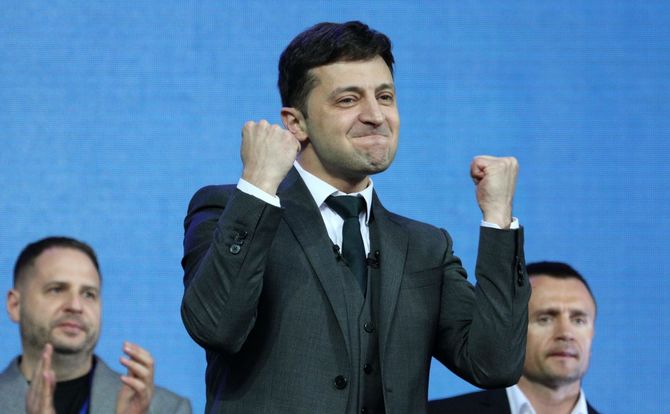Challenges for Kiev
Zelenskiy’s defeat of Petro Poroshenko in Ukraine’s presidential election had more to do with economics than relations with Russia. While resolving the conflicts in Crimea and the Donbas region will help boost economic growth, streamlining and cleaning up Ukraine’s corrupt bureaucracy will be his most important challenges.

In a nutshell
- Corruption, not relations with Russia, will be the crucial problem for Volodymyr Zelenskiy’s to solve
Ukraine’s presidential elections ended with a crushing defeat of the incumbent, Piotr Poroshenko. Volodymyr Zelenskiy, a political newcomer, won approximately 73 percent of the vote.
Although Mr. Poroshenko stabilized the Ukrainian state while fending off Russian aggression, he was unable to improve – or even hold steady – the living standards of the majority of the population. What probably damaged his standing the most, however, was his inability to significantly reduce corruption by creating a leaner, more efficient administration.
He worked hard to promote the hasty creation of a Ukrainian Orthodox Church, independent from the Patriarch of Moscow. The purpose was to avoid Russian political influence in the church in Ukraine. The move split the country’s Orthodox community in two. One part is still loyal to the Russian church, while the other one is now autocephalous – the head of the church no longer reports to a higher-ranking patriarch.
Many believed that this independence should have been the result of organic development from inside the church, rather than a political process driven by the president. That the move came shortly before the elections may have given the impression that it was made solely to attract votes.
The economy and corruption had a greater influence on the results than anything else.
Nevertheless, the economic situation and the continuing corruption had a greater influence on the results than anything else. These two factors are the liabilities that Mr. Zelenskiy inherits. Although he campaigned on improving Ukraine’s relationship with Russia, he is likely to continue the country’s pro-Western policy. One of his short-term objectives is to free the Ukrainian sailors currently imprisoned in Russia.
Better relations with Russia would also help the Ukrainian economy, but this will be a big challenge, since the countries have several difficult unresolved conflicts. Accepting the status quo in Crimea and the Donbas region would be dangerous – doing so could encourage further interventions by Russia. Moreover, Moscow is unlikely to tolerate a stable Ukraine, which could become too closely associated with the EU – and worse NATO. Moscow will consider such a state of affairs a challenge to Russia’s security and make every effort to destabilize the situation.
That a politically inexperienced newcomer is now assuming the presidency could provide an opportunity. It is easier for such a person to depart from the existing diplomatic and political processes, which have now reached a dead end. His success in doing so will also depend on his ability to get the right people in his administration.
In the fall, Mr. Zelenskiy will face parliamentary elections, which will also be important for his ability to implement policy effectively. His biggest challenge, however, will not be his country’s relationship with Russia, but the oversized and partially corrupt Ukrainian bureaucracy.
